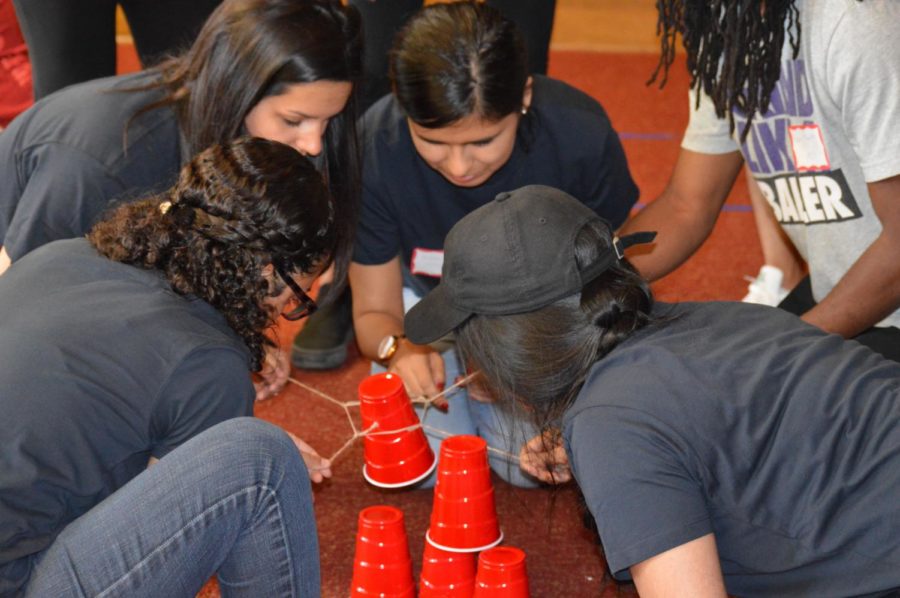Students with dietary restrictions, allergies and special diets can find options for food on campus, due to efforts from ISU Dining.
Claire Carpenter, a freshman studying agricultural business, has had celiac disease (a gluten allergy) for two years. Caroline Strawhacker, a freshman studying agricultural business and agronomy, has had a peanut allergy since she was a 7-year-old.
Strawhacker and Carpenter said as first-year students, one major adjustment to college life is eating at campus dining halls with an allergy.
Strawhacker said cross-contamination from peanuts in one item prevents her from eating any foods from the bakery, even if the item does not contain peanuts.
“The main reason why I can’t eat the bakery items is because of cross-contamination,” Strawhacker said. “There’s like one item in the bakery that has nuts, so then there’s nothing I can eat [from the bakery] without it being cross-contaminated.”
Carpenter said without the special diets kitchen at Union Drive Community Center (UDCC), she would not have a huge variety of foods to pick from. At Season’s Marketplace, Carpenter can eat gluten-free pizza, gluten-free pasta and salad, but she said it is about how many times she wants to eat that during the week.
“I can go to any dining hall on campus,” Carpenter said. “They all have some kind of accommodation.”
The special diets kitchen at UDCC offers certified gluten-free items, so students know the food is not cross-contaminated, which Carpenter said is usually her top pick.
Joshua Wilkins, the chef de cuisine of residential dining, has been with ISU Dining since December 2022. Wilkins said he started working in restaurants when he was just 14 years old and has done it ever since. Before coming to work for Iowa State, Wilkins said he worked for a company providing food services for private schools ranging from kindergarten to 12th grade.
Wilkins is in charge of writing the menus for residential dining with the input of in-unit management. He said that his team tries to pick things from all different realms, including popular dishes, global cuisines and items that are specific to certain stations in dining halls.
“We have a huge diverse population here at Iowa State so we try to throw in the types of cuisines that would match the student body,” Wilkins said. “Just last week at UDM (Union Drive Marketplace), we had African night and partnered with the African Student Association and the African Learning and Evolving Community. They were a group of students and we worked together with over a couple of months putting together an event and showcasing their cuisine.”
Focusing on accommodating the special diets students have at Iowa State, Wilkins mentioned Rebecca Harken, a registered dietician for ISU Dining. Wilkins said all of the special diet kitchen menus first have to go through Harken and the majority of the food is free of the top nine allergens, which include milk, wheat and eggs.
Carpenter and Strawhacker detailed the seriousness of their allergies and why cross-contamination is important to consider.
“A gluten intolerance or a gluten-free preference is a lot different from celiac disease because this disease makes me ill,” Carpenter said. “I’ll lose vision, pass out and could have infertility issues. So I take it pretty seriously because I know the harm it can do to me and I don’t want to be sick.”
Strawhacker made a similar statement detailing why having a peanut allergy is serious to her.
“A lot of people don’t realize that some people have an intolerance,” Strawhacker said. “I will die if I have peanuts and the main reason why I can’t eat food is because of cross-contamination.”
Wilkins said if a student with an allergy/intolerance asked one of the ISU Dining employees about what was okay to eat, staff would gladly direct them to options. If a student can not eat a menu item, dining staff will make them something made to order.
“It’s just kind of like we’re open to everything,” Wilkins said. “We do what we can when it comes to accommodating a diet. We can kind of help educate them on what we’re serving for that specific meal period. To do that, the majority of our staff are FARECheck trained, which is basically surface-level training about allergens.”
According to Wilkins, the dining halls always strive to be authentic, but they still need to appeal to the masses. Every day, residential dining serves around 10,000 people.
Wilkins said he enjoys the service aspect of working in food service and it is hard to top the sense of accomplishment you get from it, “I’m a big fan of feedback. Students can email me anytime or catch me in the dining halls, I’m here all the time.”
To make suggestions or comments about the dining halls, email Wilkins at [email protected].















Justin Haas | Nov 2, 2023 at 12:18 pm
Josh is a rockstar and it’s amazing what the ISU Dining team does day in and day out to serve the campus community!
Grace Griffin | Nov 1, 2023 at 10:36 pm
Best Article I’ve Ever Read